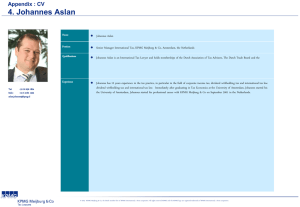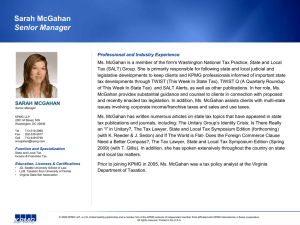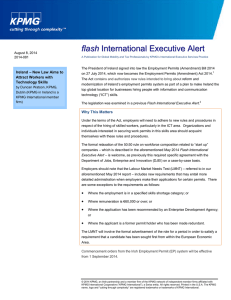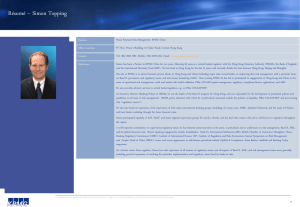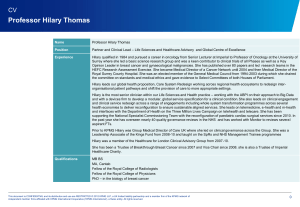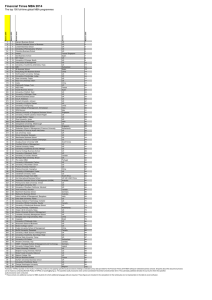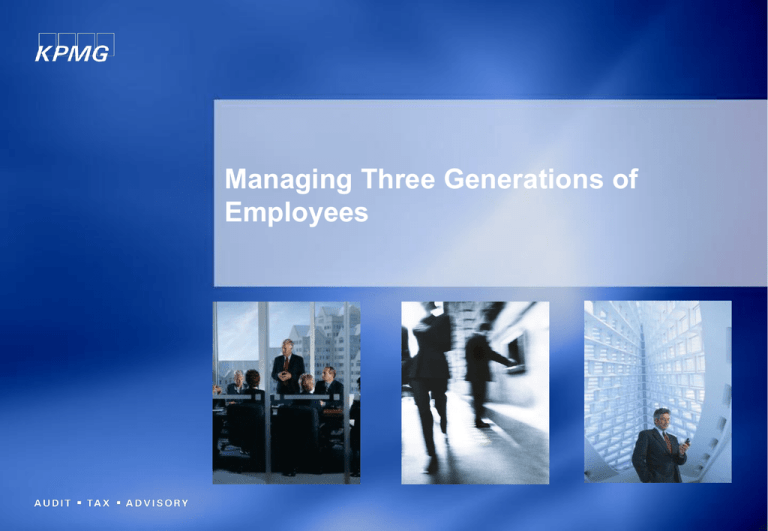
Managing Three Generations of
Employees
UNDERSTANDING
GENERATIONAL DIVERSITY
© 2006 KPMG, an Indian partnership and a member firm of the KPMG network of independent member firms affiliated with KPMG International, a Swiss cooperative. All rights reserved.
2
Baby Boomers
Generation X
Generation Y
Born between
1946 and 1964
Born between
1965 and 1980
Born after 1980
Currently occupy
senior mgmt.
positions
Currently occupy
middle mgmt.
positions
Currently occupy
entry level
positions
© 2006 KPMG, an Indian partnership and a member firm of the KPMG network of independent member firms affiliated with KPMG International, a Swiss cooperative. All rights reserved.
3
Workplace Characteristics
© 2006 KPMG, an Indian partnership and a member firm of the KPMG network of independent member firms affiliated with KPMG International, a Swiss cooperative. All rights reserved.
Source: Mixing and Managing Four Generation
of Employees –By Greg Hammill
4
Inter Generational Tension?
• Location and Timing of work
• Office vs. Mobile Working
• Office timings vs. Task timings
• Communication among team members
• Time Lag
• Mode of Communication
• Nature of Collaborative Input
• Definition of “Expert”
• Finding information or learning new things
• Source of Learning
© 2006 KPMG, an Indian partnership and a member firm of the KPMG network of independent member firms affiliated with KPMG International, a Swiss cooperative. All rights reserved.
5
Is the Asian context different from the Global
context? (Gen Y as an example)
93% of Indians
wish to have an
overseas exposure
Source: Talent Smoothie
2008 survey
© 2006 KPMG, an Indian partnership and a member firm of the KPMG network of independent member firms affiliated with KPMG International, a Swiss cooperative. All rights reserved.
6
Is the Asian context different from the Global
context? (Gen Y as an example)
Source: Talent Smoothie
2008 survey
© 2006 KPMG, an Indian partnership and a member firm of the KPMG network of independent member firms affiliated with KPMG International, a Swiss cooperative. All rights reserved.
7
MANAGING GENERATIONAL
DIVERSITY
© 2006 KPMG, an Indian partnership and a member firm of the KPMG network of independent member firms affiliated with KPMG International, a Swiss cooperative. All rights reserved.
8
What does this mean for Employers?
One size won’t fit all.
Develop a different
recruitment strategy for
each generation
Change
communication
strategies
Sell Opportunities
not Careers
Retention strategies
need to be different for
each generation in the
workforce
© 2006 KPMG, an Indian partnership and a member firm of the KPMG network of independent member firms affiliated with KPMG International, a Swiss cooperative. All rights reserved.
9
All generations want to …
• Belong
• Be valued and respected
• Have trustworthy leaders
• Make meaningful contributions
• Have resources and skills that would help them
excel
© 2006 KPMG, an Indian partnership and a member firm of the KPMG network of independent member firms affiliated with KPMG International, a Swiss cooperative. All rights reserved.
10
What can employers do?
Emphasis on understanding of the diversity in
workplaces
Create workplace choices, allow the workplace to
shape itself around the work being done as long as
customers needs are met
Make mentoring a constant (reverse mentoring)
Make your leadership style based on the situation
and people involved
86% say that generations
learn from each other
82% say that there is better
quality due to variety of
generational perspectives
Depend less on positional power and more on
personal influence
Take your time when matching individuals to a team
or a team or individual to an assignment. Do not
discriminate based on age.
© 2006 KPMG, an Indian partnership and a member firm of the KPMG network of independent member firms affiliated with KPMG International, a Swiss cooperative. All rights reserved.
11
Focus on COMMUNICATION
Take the time to communicate with your employees and use the
right medium
Do not rely on one medium only
Direct
E- based communication
• Monthly focus groups
• Monthly newsletters
• Quarterly sessions “Kascades’
• Screen Savers
• People Management Leaders
• Webcasts
One to one communication and
Feedback
© 2006 KPMG, an Indian partnership and a member firm of the KPMG network of independent member firms affiliated with KPMG International, a Swiss cooperative. All rights reserved.
12
Focus on DEVELOPMENT
• Focus on continued learning
• Adopt a blended learning strategy
• Learning through mentoring
• Train Leaders/Managers
INVEST IN THEM!!!!
How do you value the following development opportunities
“Training and development is the most
67%
62%
E-Learning
highly valued employee benefit. The
86%
85%
Job rotation
number choosing training and
91%
91%
Further academic trg
development as their first choice of
benefit is three times higher than those
92%
94%
Face to face training
97%
96%
Mentors
0%
20%
Global
40%
Asia
60%
80%
who chose cash bonuses.”
Source: PwC 2008 survey on ‘Managing tomorrow’s
people’
100%
© 2006 KPMG, an Indian partnership and a member firm of the KPMG network of independent member firms affiliated with KPMG International, a Swiss cooperative. All rights reserved.
13
Focus on RECRUITMENT STRATEGIES
Tailor your recruitment messages to the
generation, but always tell the truth
Build personalization, choice, and
control into all aspects of our
recruitment
“Corporate social responsibility (CSR) is very
Sell Opportunities and not a career
important to younger generations with 88%
stating that they seek employers with social
responsibility values that reflect their own”
Source: PwC 2008 survey on ‘Managing tomorrow’s people’
14
© 2006 KPMG, an Indian partnership and a member firm of the KPMG network of independent member firms affiliated with KPMG International, a Swiss cooperative. All rights reserved.
14
Focus on RECRUITMENT STRATEGIES
Use the right medium
Sources of Information when looking for a job (Generation Y)
Brochures
National Press
Campus PPT
Internships
Career Fairs
Referrals
Company Website
0%
10%
20%
30%
40%
50%
60%
70%
80%
Source: Talent Smoothie 2008 survey
15
© 2006 KPMG, an Indian partnership and a member firm of the KPMG network of independent member firms affiliated with KPMG International, a Swiss cooperative. All rights reserved.
15
Most-valued rewards
Baby Boomers
Generation X
• Retirement planning
assistance
• Training
• Acceptable time
offs, including
sabbaticals
• Skill development
• Continuous
feedback
• Flexible work
arrangements and
positive work
environment
Generation Y
• Learning and
development
opportunities
• Credible and
positive role models
• Work/life balance
© 2006 KPMG, an Indian partnership and a member firm of the KPMG network of independent member firms affiliated with KPMG International, a Swiss cooperative. All rights reserved.
16
To summarise
You Must
Do Not
•
Assign Mentors
•
Micromanage
•
Communicate
•
Isolate with similar age groups (provide
•
Offer different modes of learning
•
Constant Feedback
•
Job Rotations / Variety of Work
•
Align Organizational Goals with
interests of employees
•
Ask for new ideas and listen
•
Provide infrastructure for collaboration
interaction with senior members, esp.
Boomers)
•
Use the same management sytle with all
generations
•
Delegate without making the connection
to the bigger picture
© 2006 KPMG, an Indian partnership and a member firm of the KPMG network of independent member firms affiliated with KPMG International, a Swiss cooperative. All rights reserved.
17
The challenge will continue…..
Get prepared for Generation M
“Future generations will continue to be significantly
different and firms and institutions who adapt fastest will
capture the highest quality employees.”
© 2006 KPMG, an Indian partnership and a member firm of the KPMG network of independent member firms affiliated with KPMG International, a Swiss cooperative. All rights reserved.
18
Sources used in preparation of this presentation
•
•
•
•
•
•
•
•
•
•
•
•
•
•
•
Penelope Trunk (2006) Brazen Careerist “Teamwork is a great way to sidestep office hierarchy”
•
Terjesen, Vinnicombe & Freeman (2007) Career Development International “Attracting Generation Y graduates: Organizational attributes,
likelihood to apply and sex differences”
•
•
•
•
TalentSmoothie (2008) ‘Global Tell is how it is’ Summary Research Report, Asia
Penelope Trunk (2008) Brazen Careerist “Are you a Gen Y Magnet”
Penelope Trunk (2009) Brazen Careerist “How to lead in the New Millennium”
Gary Hamel (2009) The Wall Street Journal “The Facebook Generation vs. the Fortune 500”
Gary Hamel (2009) The Wall Street Journal “Empowering Natural Leaders in ‘Facebook Generation’ Ways”
Tulgan & Martin (2008) Rainmaker Thinking Inc. “Managing the Generation Mix™ ”
Tammy Erickson (2008) Harvard Business Review Ideacast “Managing Generation Y”
Tammy Erickson (2009) Harvard Business Review “The Four Biggest Reasons for Intergenerational Conflict”
Tammy Erickson (2009) Harvard Business Review “Guide to Managing Ys”
Tammy Erickson (2009) Harvard Business Review “Global Generations: Focus on India”
Navi Radjou (2008) Harvard Business Review “Wanted – Entrepreneurs who can ignite 550 Million Minds”
Cristina Simón (2008) Universia Knowledge @ Wharton – “Generation Y and the Labor Market: Models for HR Management”
Alan Whalley (2008) Mercer “Why CEOs Need to Understand Generation Y ”
Andres Tapia (2008) Hewitt Associates “The Millennials”
Twenge & Campbell (2008) Journal of Managerial Psychology “Generational differences in psychological traits and their impact on the
workplace”
PricewaterhouseCoopers (2007) “Managing Tomorrow’s People – The future of work to 2020”
PricewaterhouseCoopers (2009) “Managing Tomorrow’s People – Millennials at work: Perspectives from a new generation”
Worldone Research (2009) “LexisNexis Technology Gap Survey”
© 2006 KPMG, an Indian partnership and a member firm of the KPMG network of independent member firms affiliated with KPMG International, a Swiss cooperative. All rights reserved.
19
The information contained herein is of a general nature and is not intended to address the circumstances of any particular individual or entity. Although we endeavor to provide accurate and timely information, there can be no guarantee that such information is accurate as of the date it is received or that it will continue to be accurate in the future. No one
should act on such information without appropriate professional advice after a thorough examination of the particular situation.
Presenter’s contact details
Niloufer Irani
KPMG
+91 22 39835528
nirani@kpmg.com
www.in.kpmg.com
© 2006 KPMG, an Indian partnership and a member firm of the KPMG network of independent member firms affiliated with KPMG International, a Swiss cooperative. All rights reserved.
20
An aging world – 2025
Percent of Population Age
60+:
Under 5%
5% to 12.4%
12.5% to 20%
Above 20%
Source: U.S. Census Bureau
© 2006 KPMG, an Indian partnership and a member firm of the KPMG network of independent member firms affiliated with KPMG International, a Swiss cooperative. All rights reserved.
21

